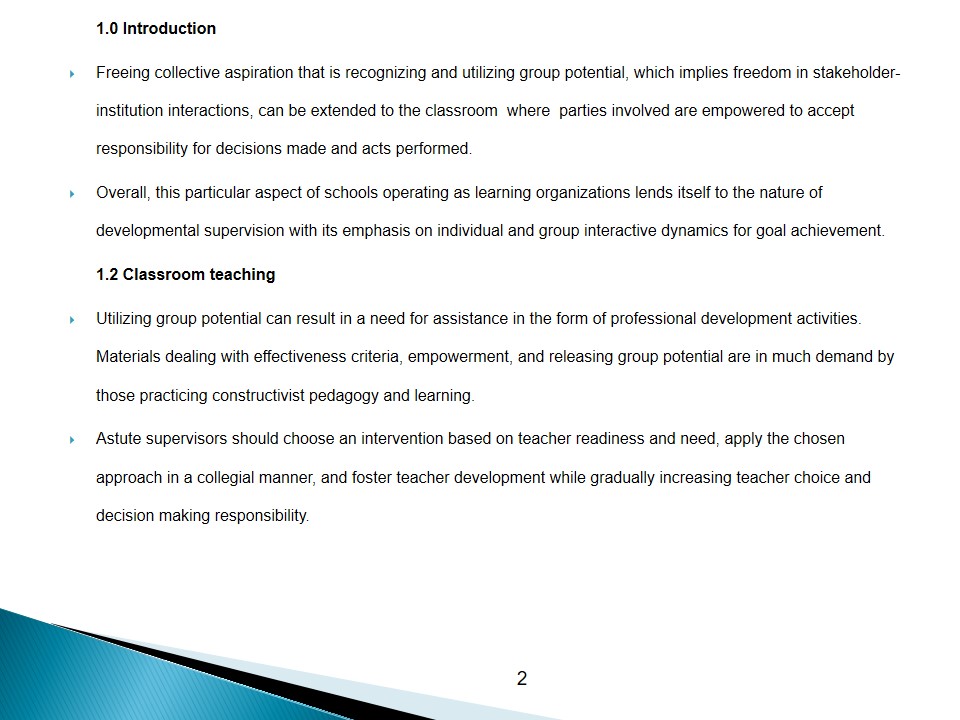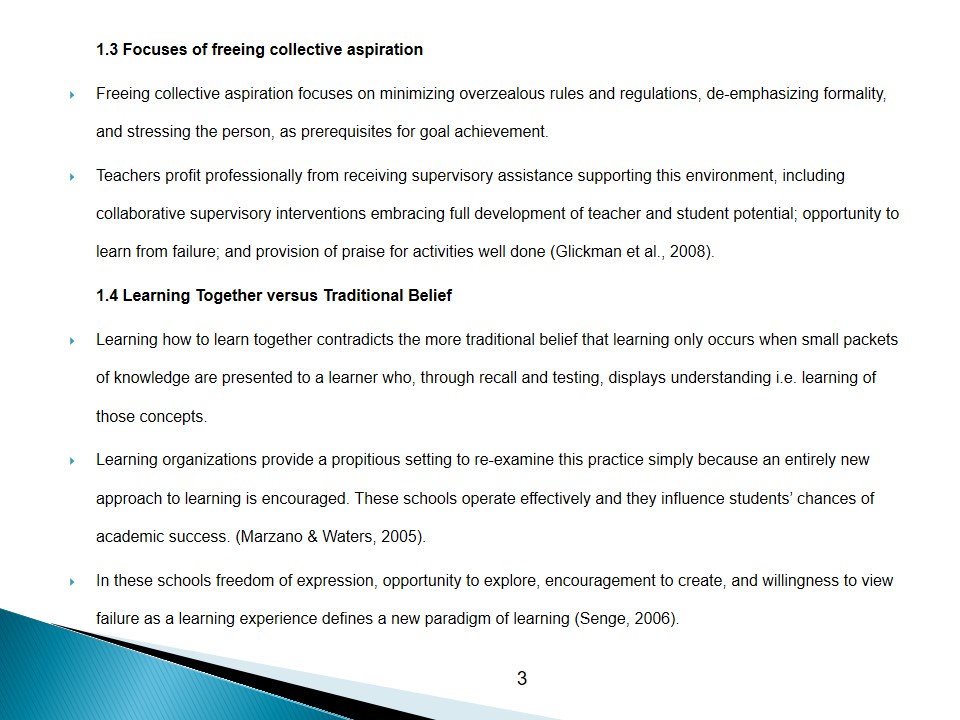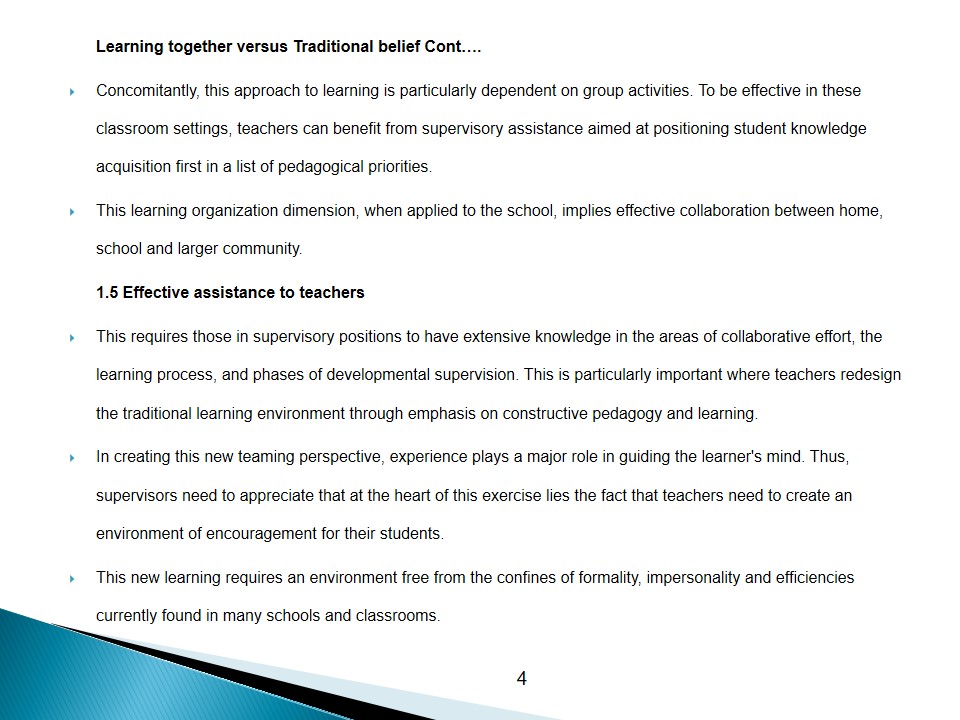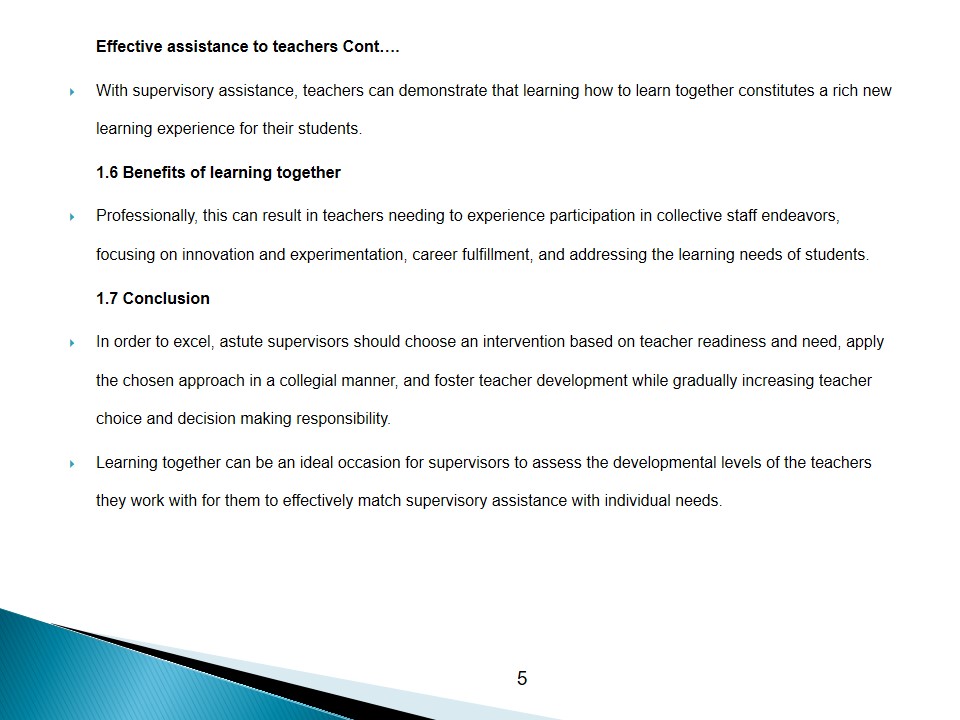Introduction
Freeing collective aspiration that is recognizing and utilizing group potential, which implies freedom in stakeholder-institution interactions, can be extended to the classroom where parties involved are empowered to accept responsibility for decisions made and acts performed.
Overall, this particular aspect of schools operating as learning organizations lends itself to the nature of developmental supervision with its emphasis on individual and group interactive dynamics for goal achievement.
Classroom teaching
Utilizing group potential can result in a need for assistance in the form of professional development activities. Materials dealing with effectiveness criteria, empowerment, and releasing group potential are in much demand by those practicing constructivist pedagogy and learning.
Astute supervisors should choose an intervention based on teacher readiness and need, apply the chosen approach in a collegial manner, and foster teacher development while gradually increasing teacher choice and decision making responsibility.

Focuses of freeing collective aspiration
Freeing collective aspiration focuses on minimizing overzealous rules and regulations, de-emphasizing formality, and stressing the person, as prerequisites for goal achievement.
Teachers profit professionally from receiving supervisory assistance supporting this environment, including collaborative supervisory interventions embracing full development of teacher and student potential; opportunity to learn from failure; and provision of praise for activities well done (Glickman et al., 2008).
Learning Together versus Traditional Belief
Learning how to learn together contradicts the more traditional belief that learning only occurs when small packets of knowledge are presented to a learner who, through recall and testing, displays understanding i.e. learning of those concepts.
Learning organizations provide a propitious setting to re-examine this practice simply because an entirely new approach to learning is encouraged. These schools operate effectively and they influence students’ chances of academic success. (Marzano & Waters, 2005).
In these schools freedom of expression, opportunity to explore, encouragement to create, and willingness to view failure as a learning experience defines a new paradigm of learning (Senge, 2006).
Concomitantly, this approach to learning is particularly dependent on group activities. To be effective in these classroom settings, teachers can benefit from supervisory assistance aimed at positioning student knowledge acquisition first in a list of pedagogical priorities.
This learning organization dimension, when applied to the school, implies effective collaboration between home, school and larger community.

Effective assistance to teachers
This requires those in supervisory positions to have extensive knowledge in the areas of collaborative effort, the learning process, and phases of developmental supervision. This is particularly important where teachers redesign the traditional learning environment through emphasis on constructive pedagogy and learning.
In creating this new teaming perspective, experience plays a major role in guiding the learner’s mind. Thus, supervisors need to appreciate that at the heart of this exercise lies the fact that teachers need to create an environment of encouragement for their students.
This new learning requires an environment free from the confines of formality, impersonality and efficiencies currently found in many schools and classrooms.
With supervisory assistance, teachers can demonstrate that learning how to learn together constitutes a rich new learning experience for their students.

Benefits of learning together
Professionally, this can result in teachers needing to experience participation in collective staff endeavors, focusing on innovation and experimentation, career fulfillment, and addressing the learning needs of students.
Conclusion
In order to excel, astute supervisors should choose an intervention based on teacher readiness and need, apply the chosen approach in a collegial manner, and foster teacher development while gradually increasing teacher choice and decision making responsibility.
Learning together can be an ideal occasion for supervisors to assess the developmental levels of the teachers they work with for them to effectively match supervisory assistance with individual needs.

References
Glickman, Carl., Gordon, Stephen., & Jovita, Ross-Gordon. (2008). The basic guide to supervision and instructional leadership (2nd ed.). Boston, USA: Allyn & Bacon Publishers.
Marzano, Robert., & Waters, Timothy. (2005). School leadership that works. Virginia, USA: Association for Supervision and Curriculum Development.
Senge, Peter. (2006). The fifth discipline: the art and practice of the learning organization (2nd ed.). New York, USA: Crown Business.